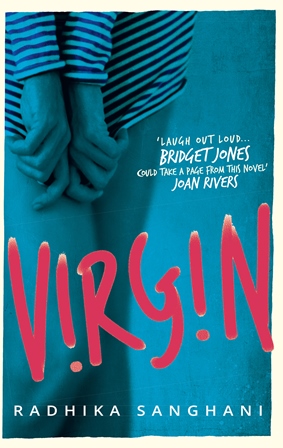Debut novelist Radhika Sanghani shares writing advice and her tips for writing across different genres.

My debut novel, Virgin, is just about to be released here in the UK. Whenever someone asks me what genre it belongs in, I'm never quite sure what to say, because it doesn't really fit into a typical genre. I sum it up by saying 'women's fiction', but really it's Comedy, Young Adult, Chick Lit, New Adult and Women's Literature all rolled up into one.
But, somehow, this seems to be what publishers (and readers) want right now. My genre-crossing novel is coming out in about 13 different countries, as far away as Japan and Brazil. When I was writing my London-based novel about a 21-year-old student trying to lose her virginity, I couldn't have predicted that this would ever happen.
But it has, and it has taught me several valuable lessons about genres. Namely, that they aren't as important as you might think they are, and that sometimes it pays off to be brave.
1) Not thinking about genres frees you
When I started writing my novel, I had no idea it would be published. I was just doing it as a fun project for myself and my friends. It meant that I didn't think twice about genres, target audiences or typical readers. I just wrote.
You might think that having such a carefree attitude towards writing would be a hindrance. But actually, it freed me. I ended up writing a book that breaks so many taboos in women's fiction that it has now transcended that very genre.
I was able to write about the things I cared about without worrying about who'd read them, and I was able to get my message across without thinking about everyone who'd disagree with it. In the end, it offered me a huge amount of freedom and meant I was able to write something pretty different to what's already out there.
2) You can't predict what everyone wants
If I'd thought too much about genres when I was writing my novel, I probably would have written something that fit more solidly into a genre. It could still have been published, but I'm not so sure that it would have. Because when it came down to it, what my publishers liked about my book was that it was so unusual.
My decision was essentially a risk and it might not pay off for everyone. But in my case, having a novel that crossed genre boundaries turned out to be what publishers were looking for.
3) Look at what's already out there
Of course, having said all of this, you do have to have an idea of who will read your book, especially when you're pitching it to agents/publishers/etc. All I knew was that people like me would enjoy it - young, 20-something women with a sense of humour.
Luckily, at the time, there were TV shows like 'Girls' around which were exactly that genre. It didn't have a name, and still doesn't, but that audience did exist. It meant that when I was pitching my book to my current agent, I could mention that current social trend. I couldn't give her a clear genre, but I could give her an idea of who'd read it.
4) Be prepared for rejections
When you're writing a novel that doesn't fall into a typical genre, you're taking a big risk and it's not one that everyone will agree with. In my case, even though I did find an agent pretty quickly, we did find that some publishers were reluctant to take on Virgin because they weren't sure how they would market a genre-crossing novel.
But luckily my current publishers, Harlequin, found this an exciting challenge and are now reaching audiences that are often quite neglected by publishers. We're not marketing it to a particularly niche audience, and my American publishers - Penguin - have even gone for two book covers to try and attract two different audiences.
5) Just write...
As I mentioned earlier, forgetting about genres was incredibly beneficial for me. When I was editing Virgin before submitting it to agents, I used to worry that the genre-crossing would make the book unsellable. But my experience has reminded me that actually, readers don't think about genres as much as authors do.
Readers think very broadly about genres, and most don't know what New Adult and YA even are. It means that having a book that either fits specifically into a genre, or crosses many, won't affect a reader's enjoyment of your novel.
As an author, all you need to do is write something wonderful. Let your future publishers and reviewers worry about what genre it belongs to - you just focus on writing the best book you can.
Radhika Sanghani is a 23-year-old journalist writing about women and women’s issues. She has an MA in Newspaper Journalism from City University London, a BA in English Literature from University College London, and recently came second in GQ’s Norman Mailer writing competition. Find out more about Radhika and her debut novel on her website.
Comments